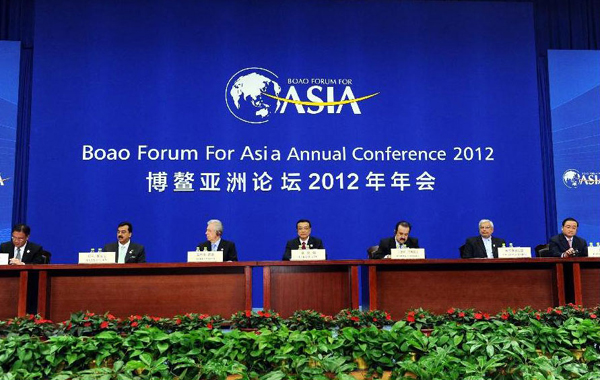Euro debt crisis affecting Asia
 0 Comment(s)
0 Comment(s) Print
Print E-mail China Daily, April 3, 2012
E-mail China Daily, April 3, 2012
The effects of the eurozone's debt crisis have been spreading at an obvious pace to Asian countries, a former senior banking official warned on Monday.
|
|
|
Boao Forum for Asia Annual Conference 2012 kicks off Monday at the scenic town of Boao, Hainan. |
And the region's economic growth is not expected to regain momentum in the short term, said Liu Mingkang, former chairman of China Banking Regulatory Commission, who was attending the Boao Forum for Asia in Hainan province.
"The economic performance of major Asian countries has remarkably deteriorated since last year, proving the debt crisis has affected the area in obvious ways," he said.
Liu said China, Japan and other large Asian countries must move more quickly to reform their economies if they are to counter the harm that is being done by the eurozone's debt troubles.
John Chambers, managing director of sovereign ratings at Standard & Poor's Financial Services LLC, said China's greatest vulnerability stemming from the euro crisis lies in the possibility that there will be a sharp decrease in its exports if the mild recession in Europe and slow growth in US develop into a deep economic contraction as severe as what happened in 2008 and 2009.
"I don't see too much exposure to the financial sector," he said. "Mostly it's a trade issue."
Chambers said the Chinese government is likely to rely on conventional means of shoring up the country's economy instead of responding with an aggressive fiscal stimulus, as it had in the past with the help of local governments.
"China has large room to maneuver, both on the fiscal side and monetary side," he said. "But if there is a global depression, no one is going to escape it."
Toshiro Mutoh, chairman of Daiwa Institute of Research, said the European debt crisis has dampened Asian countries' prospects by slowing activity in the financial markets and hindering trade in the region.
"The ongoing deleveraging in Europe has led to a backflow of capital from Asia," Mutoh said. "Asian countries should establish a 'firewall' against that."
"I don't think the debt problem in Europe is posing an increasing threat to China and other Asian countries," said Li Daokui, a former adviser to the central bank monetary policy committee and a professor at Tsinghua University.
Li said the situation is actually getting better, especially after the European Central Bank injected liquidity into the market, officials approved establishing a firewall consisting of 800 billion euros ($1.06 trillion) and large countries such as Italy agreed to make reforms.
"And China's risk exposure to euro debt is very small and controllable."
Liu said the eurozone has made progress in responding to the debt troubles, especially by adopting austerity measures and injecting liquidity into market. But those steps aren't expected to go far enough to solve the fundamental problem.
"What's more, stricter austerity will make some countries less able to repay debts," Liu said.
Despite Europe's unclear prospects, China should be more aware in the long term of the risks that are hidden in the US economy instead of those in Europe, Liu said.
"The unemployment situation and consumers' confidence in the US haven't improved yet," he said. "In addition, its huge fiscal deficit will probably lead to a decline in interest rates and drag down economic activity."







Go to Forum >>0 Comment(s)